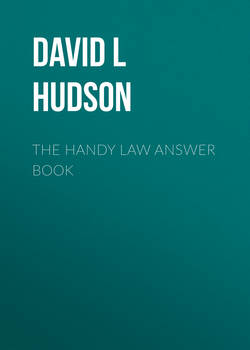Читать книгу The Handy Law Answer Book - David L Hudson - Страница 62
На сайте Литреса книга снята с продажи.
What are the powers of the president?
ОглавлениеThe president, as the “Commander in Chief,” can grant pardons, make treaties, appoint ministers and consuls, justices of the Supreme Court, and “all other Officers of the United States.” The president also can fill vacancies that occur in the Senate by granting commissions. The president has the power to carry and enforce the laws made by Congress, has the power to veto or reject laws passed by Congress, and can issue executive orders that have the force of law.
LegalSpeak: Clinton v. City of New York (1997)
The Line Item Veto Act authorizes the president himself to effect the repeal of laws, for his own policy reasons, without observing the procedures set out in Article I, Section 7. The fact that Congress intended such a result is of no moment. Although Congress presumably anticipated that the president might cancel some of the items in the Balanced Budget Act and in the Taxpayer Relief Act, Congress cannot alter the procedures set out in Article I, Section 7, without amending the Constitution.
Neither are we persuaded by the Government’s contention that the president’s authority to cancel new direct spending and tax benefit items is no greater than his traditional authority to decline to spend appropriated funds. The Government has reviewed in some detail the series of statutes in which Congress has given the Executive broad discretion over the expenditure of appropriated funds. For example, the First Congress appropriated “sum[s] not exceeding” specified amounts to be spent on various Government operations…. In those statutes, as in later years, the president was given wide discretion with respect to both the amounts to be spent and how the money would be allocated among different functions. It is argued that the Line Item Veto Act merely confers comparable discretionary authority over the expenditure of appropriated funds. The critical difference between this statute and all of its predecessors, however, is that unlike any of them, this Act gives the president the unilateral power to change the text of duly enacted statutes. None of the Act’s predecessors could even arguably have been construed to authorize such a change….
If there is to be a new procedure in which the president will play a different role in determining the final text of what may “become a law,” such change must come not by legislation but through the amendment procedures set forth in Article V of the Constitution.
